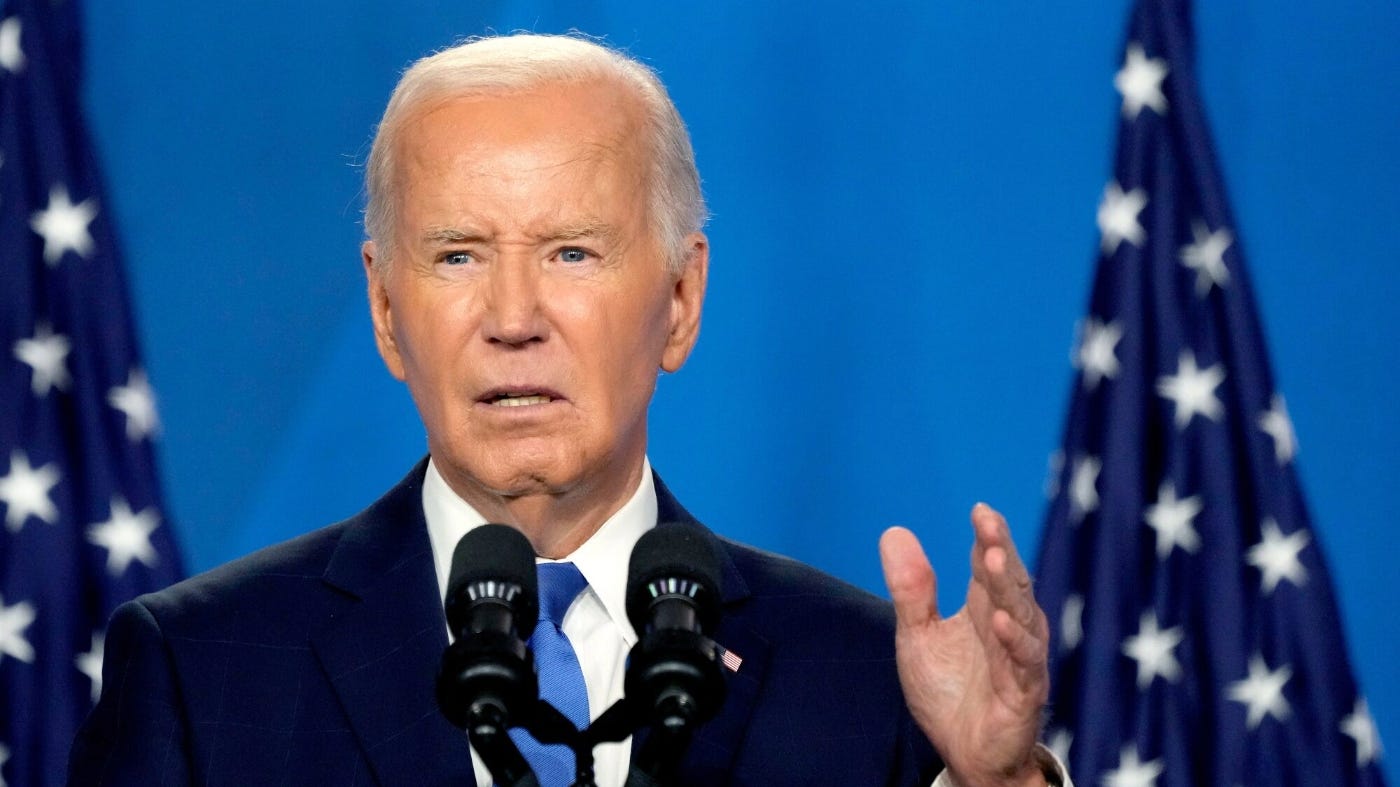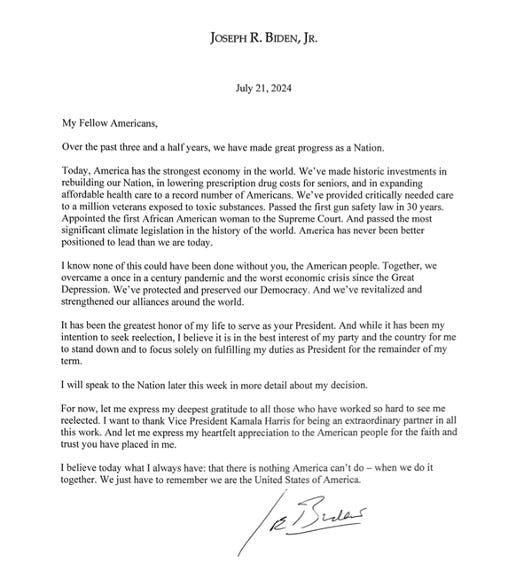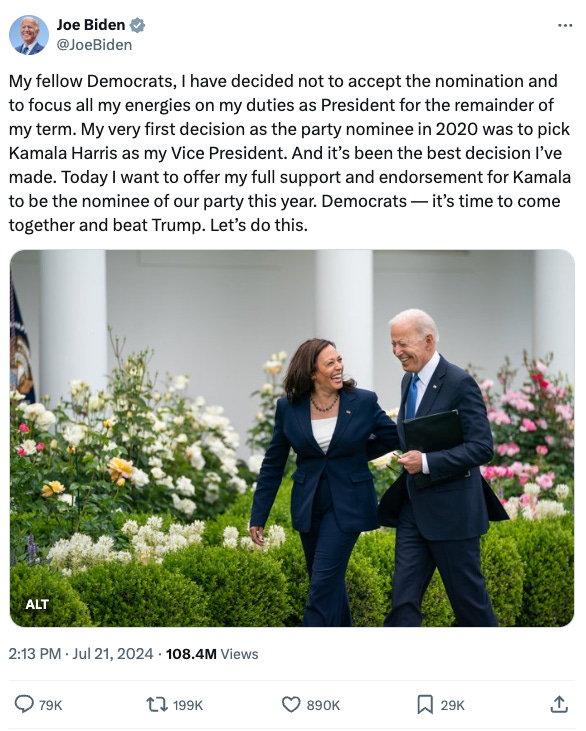What to Say When You’re Resigning as Leader of the Free World: An Analysis of President Biden’s Comms Strategy this Weekend
Let’s take a look at President Joe Biden’s communications response to the highest profile political crisis in our lifetimes, from “deny, deny, deny” to “you won’t have Joe Biden to kick around anymore
It’s been 24 hours since President Joe Biden finally acquiesced to the rising cacophony of voices – constituents, pollsters, party leaders, media and more – demanding that he end his 2024 reelection campaign. As I type these words, the news cycle has already moved on to “Day 2” stories like House Speaker Mike Johnson calling on Biden to resign immediately and Vice President Kamala Harris’ potential VP picks.
The pressure had been silently building for months before Biden’s debate with Donald Trump on June 27, but following that disastrous performance, power brokers across the Democratic Party began aligning behind the scenes (and sometimes out in front) to encourage Biden to step down. It didn’t help that Democrat voters, if polling is to be believed, seemed to agree with them.
But stepping down from the biggest job in the world, preserving one’s own dignity and legacy, all while setting up your successor for, well, success is a uniquely challenging prospect.
From a communicator’s perspective, we can learn a lot from the steps (missteps?) made by Team Biden, such as it is, yesterday and in recent weeks.
The Statement & The Strategy
Here’s the statement that rocked everyone’s Sunday afternoon. On “Joseph R. Biden, Jr.” letterhead (notably not official White House or Biden-Harris campaign authority) Biden spent two grafs invoking his record of the past 3½ years, then another thanking his target audience while lightly gaslighting us about COVID-19 being over, laughably written as the President himself recovers from COVID in the midst of the biggest summertime spike in the virus’ four-year history.
All this throat-clearing is prelude to the money graf, where Biden announces he will be the first U.S. President since Lyndon B. Johnson to not seek reelection.
The lack of official executive or Democratic Party imprimatur on the message is notable, as is the tonality compared to past Biden communications that have been delivered in conjunction with those institutions. To keen eyes, this message was clearly drafted by Biden, in his voice, and with little input or interference from his communications support team.
The message tails off with some vague allusions to a future statement, a general thank you to unnamed supporters, and a specific thank you to Vice President Kamala Harris. (Conspicuously absent: an explicit endorsement of Harris.)
The communication was delivered across social channels (reportedly to the surprise of Democratic leaders, organizations, and stakeholders) and neither Biden nor any official spokespeople were made available to media.
What Was Good: The Timing, The Delivery, The Framing
Put your personal politics aside for a moment (in full transparency, mine are far to the left of ol’ Dark Brandon) and consider the challenge of having a client whose organization has morphed in less than a month into a collection of careerist vipers hoping to outlast their waning leadership and willing to leak any details of private interactions in the hopes of getting them to step aside. (Ironically, then-President Trump experienced a version of this, as well.)
This dynamic quickly caused Biden’s inner circle to shrink to the point where it was reported his “small council” came to consist of his wife Jill and son Hunter. Not exactly a team of rivals. Family is great, but making the biggest decision of your life that will materially impact the entire planet should maybe include a few people who aren’t deeply invested in the status quo.
There’s no perfect time to announce that you won’t be seeking reelection to the highest office in the country. There’s no Friday evening news-dump-friendly cycle to hide behind, no national tragedies that can trump it. This isn’t a bad earnings call, or a weaker-than-expected jobs report. The announcement would immediately be the biggest story in the world in a moment of acceleration, when the public is routinely fire-hosed by earth-shattering, mind-warping news stories on what feels like a daily basis.
(A quick aside about this: I can’t recommend enough the 2016 Adam Curtis documentary for the BBC, HyperNormalisation, when trying to better understand the challenges of communicating in this insane era when entire generations are losing touch with the reality of power and money.)
That said, let’s think about yesterday, a chill Sunday afternoon in July where the biggest news story was Team USA’s Men’s Olympic Basketball squad nearly losing to South Sudan the day before. It was one week after a failed assassination attempt against Biden’s political rival, what promised to be an iconic and transformative moment but turned out to be little more than a windfall for t-shirt bootleggers. It was just days after a rollicking Republican National Convention focused squarely on Biden’s infirmity, and just hours after anonymous Democratic lawmakers became more and more emboldened to speak on the record against Biden. Cynical? Sure, but from a communications perspective this was the best moment among less-than-ideal choices.
On Thursday, August 8, 1974, facing impeachment, Richard Nixon’s resignation came via primetime television. Six years earlier, 1968, the aforementioned LBJ – who had made up his mind up to a year earlier, according to his Press Secretary – sent his message on Sunday evening, March 31, 1968. Prior to those instances, all other presidential campaign resignations were communicated solely by print.
Biden was a 31-year-old freshman Senator when Nixon resigned, and his career endured to 2024, when a simple black-on-white JPEG shared across social channels can achieve wider reach with more control than primetime television or radio. This delivery method, along with the benefit of being a light production lift, holds added benefits when your chief spokesman’s best public speaking days are behind him.
As much as I disagree with the substance of his purported policy wins and political successes (buy me a drink someplace private and we can talk politics) it was the correct framing to use. Absent this context, the communication comes across as an expression of failure and weakness, an explicit mea culpa. Good on him for taking credit for his legacy, such as it is.
What Was Bad: Discordance, Coordination, Succession, Saltiness
One of the most loathsome places for a communicator to find themselves is the absolute depths of hell that is the 30th day of a crisis that could have been stanched on Day 1. When all other strategies, trick-plays, and delays run out, and your client finally decides to do what they should have done all along, it’s all you can do not to rub your fists into your eyes and shout, “FINALLY. THANK YOU.”
I can’t help but think about the comms pros on Team Biden who were doing this yesterday.
Sunday’s resignation came after weeks of discordant on- and off-the-record messaging from Biden, the DNC, leadership and other party elites. Biden, as recently as Saturday, signaled his intention to serve out this term and the next. During a recent well-intentioned but poorly executed TikTok influencer outreach campaign, Biden was questioned frankly by young content creators about his age and viability, and about his intention to stay in the race. He was unequivocal – “One thousand percent,” he told one interviewer. When reports emerged to the contrary throughout July, stating that Biden was weighing his options, his official team would return with ever more forceful assurances that he was all-in.
This discordance led to a lack of coordination with other Party extremities, who were largely taken by surprise by Sunday’s announcement. This was doubtless a bit of saltiness on Biden’s part, feeling the firm push in his back from entities scrambling to replace him while offering disingenuous plaudits and appreciation on his way out.
Whether or not there was enmity behind this lack of coordination, it was perceived as a slight to his Vice President. It took a half hour for Biden to issue a Tweet (sorry, we don’t use “X” on this Substack) clarifying his support for Harris. The execution felt either slapdash or intentional, but either way, it raised eyebrows. Time will tell if any deep divisions between Biden, Harris, and the party elite erode the Democrats’ brand in the eyes of voters.
Overall Grade: B-
The overarching contextual challenge of this communication effort was self-inflicted wounds. Candidate Joe Biden earned his victory in 2020 with an implicit promise that he would be a “transitional president” (remember that?) bridging the Democratic Party from the olden days to future generations of leaders, and voters bought into that.
The more cynical among us saw Biden as a somewhat capable administrator for an unsteady empire lurching into its flop era; a familiar face to remind us of the good old days as the seas continue to boil, the world around us continues to price us out of existence, and corporate greed makes the “American Dream”, whatever that was, less and less attainable. He was the perfect grandpa to tuck us in with stories about Camaros of yore, gently putting us down for the long sleep.
Still others saw a vote for Biden-Harris as a vote for a permission structure that would allow them to stop caring about the toxic morass of American politics. Hey, I get it.
In any case, Biden had the chance to make his intentions known well before suffering a national embarrassment. He squandered the trust and equity he earned over his term. He made the Democrats’ path to remain in power infinitely more difficult. His obstinance forced fissures throughout the party and the electorate – many of whom retain loyalty to Joe.
But if we’re being honest, most crisis responses stem from self-owns like this; our job is to rate the response to the crisis, and faced with limitations in time, resources, and options, the folks in charge of this comms effort did about as good as they could. They had a candidate who was unfit for live or even taped media; a candidate who has visibly diminished in recent years; a candidate who himself was gaslit into believing he could muster the verve to compete in this election and who (let’s be honest) probably holds a deep reservoir of hubris from decades of political fame and success that made him eager to believe.
With these limitations, and on a truncated timeline to deliver success on the largest political stage there is, Biden’s eventual resignation could have gone far, far worse.
Enjoy retirement and your ice cream, Joe.






